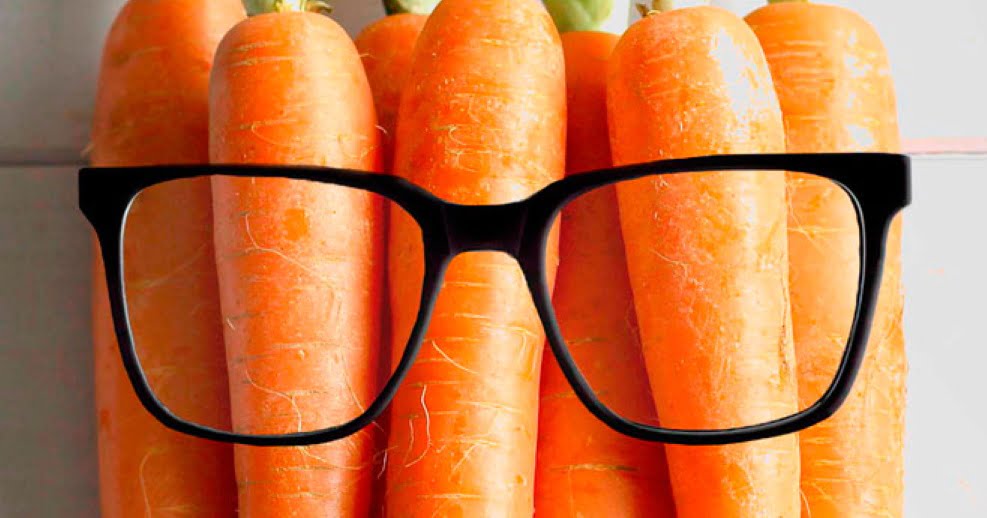According to widespread information, the story about the incredible benefits of carrots for vision is a fake that appeared during the Second World War. During German air raids, British pilots used an advanced thing for their time - airborne radars, but hid this fact, citing the unique properties of the carrots they ate. We checked to see if this was the case.
Here is what is said about this in article “Arguments and Facts” (Belarus):
“Carrots promote normal metabolism, increase resistance to colds, and help preserve vision. But the story about the incredible benefits of carrots for vision is a myth that appeared during World War II. In 1940, to repel air attacks, the British used airborne radar, which detected the approach of enemy aircraft even in the dark and at great distances. The presence of radars was kept secret, so the pilots came up with another explanation for their “phenomenal vision” - a diet of carrots. And people quickly picked up the legend.”
Confirmation of information can also be found on such popular resources as "Kommersant", The Guardian, nv.ua, Insider and many others.
Some sources refer to a study whose results were published in the respected Smithsonian magazine in August 2013. The author of the study, curator of the World Carrot Museum John Stolarczyk, having studied documents and press from different years, compiled the following picture of events.
During the German raids on Britain in 1940, the Luftwaffe often carried out attacks under cover of darkness. Royal Air Force aircraft were able to successfully resist the enemy thanks to new secret technology. Airborne radar station (radar), first used by the British in 1939, detected enemy bombers before they reached the English Channel. But in order to keep its technology a secret, the government of the United Kingdom decided to put into circulation a rather original version of its success - carrots. Stolarczyk was convinced that this was the case by papers from the Imperial War Museum, the archives of the Mass Surveillance Project and the National Archives of Great Britain.
It all started when, on November 19, 1940, a young British pilot John Cunningham For the first time in history, he shot down an enemy aircraft using radar. The last detail, of course, was unknown to the general public, but it was well known that at the time of the military feat it was night outside the window. After several months of such phenomenal results, Cunningham would earn the nickname Cat's Eye. But that will happen later, but first the British leadership had to come up with a plausible - if it can be called such - legend. Lord Woolton, British Minister of Food, promised fellow citizens that their eyesight would be as good as Cunningham's if they ate enough carrots and stopped complaining about the lack of rationed meat. Moreover, what is the easiest way to get children to eat carrots? That's right: tell them it's the heroes' favorite food.
That’s when a grandiose advertising campaign began, which is still the stuff of legends.

There is no evidence that the Germans fell for this ploy. According to Stolarczyk, only stories have reached us about how the commanders of the Third Reich began to feed their pilots carrots, thinking that there was some truth in the news from Foggy Albion. Moreover, there is no strict evidence that the recipients of the ruse were German military officials. But this British propaganda had a flawless effect on its own citizens. People believed that during blackout (a common practice during German bombing hours), carrots helped to see perfectly in the dark.

Perhaps the fashion for “carrot” vision would have faded at some point, but Germany soon imposed a food blockade on Great Britain and officials had to launch a campaign to popularize dishes made from available vegetables. In one of the ministerial issues "Military Cookery Brochures" featured recipes for carrot pudding, carrot cake, carrot marmalade and carrot cake. Every Briton knew what Doctor Carrot looked like - a cute character who protected people from illnesses. The Doctor and his carrot family were born thanks to the studio's artists Disney. Parallel to the ocean screen fight Another popular hero Bugs Bunny, not a carrot, but a big fan of it, led against Hitler.
Thus, carrots really owe their fame as a means of “improving vision” to fake military propaganda. But is this vegetable really so useless for the eyes? Of course, in carrots contained significant amounts of vitamin A (in the form of its provitamin beta-carotene). StudyA 1998 Johns Hopkins School of Medicine study of 30,000 South Asian women found that the group taking vitamin A tablets had 67% fewer cases of night blindness than the group receiving a placebo. However, in 2003 another experience with men brought a completely different result: patients who consumed carotene for 12 years were indistinguishable in the degree of cataract development from placebo users. The general conclusion that from these and other experiments done ophthalmologists, is this: vitamin A can help with night blindness, but with cataracts it is practically powerless. In addition, vitamin A can be effective for vision only if there is a deficiency of this substance in the body; in other cases, it is truly useless. And sometimes it may turn out dangerous - at especially large doses. In other words, carrots in some cases help normalize vision (in particular, in the dark), but will not make your normal vision “eagle” or “cat”.
Is it true
Read on topic:
1. A WWII Propaganda Campaign Popularized the Myth That Carrots Help You See in the Dark
2. Really?
4. Carrots and blueberries improve vision
5. WW2 — "Carrots Help you see in the dark"
If you find a spelling or grammatical error, please let us know by highlighting the error text and clicking Ctrl+Enter.







